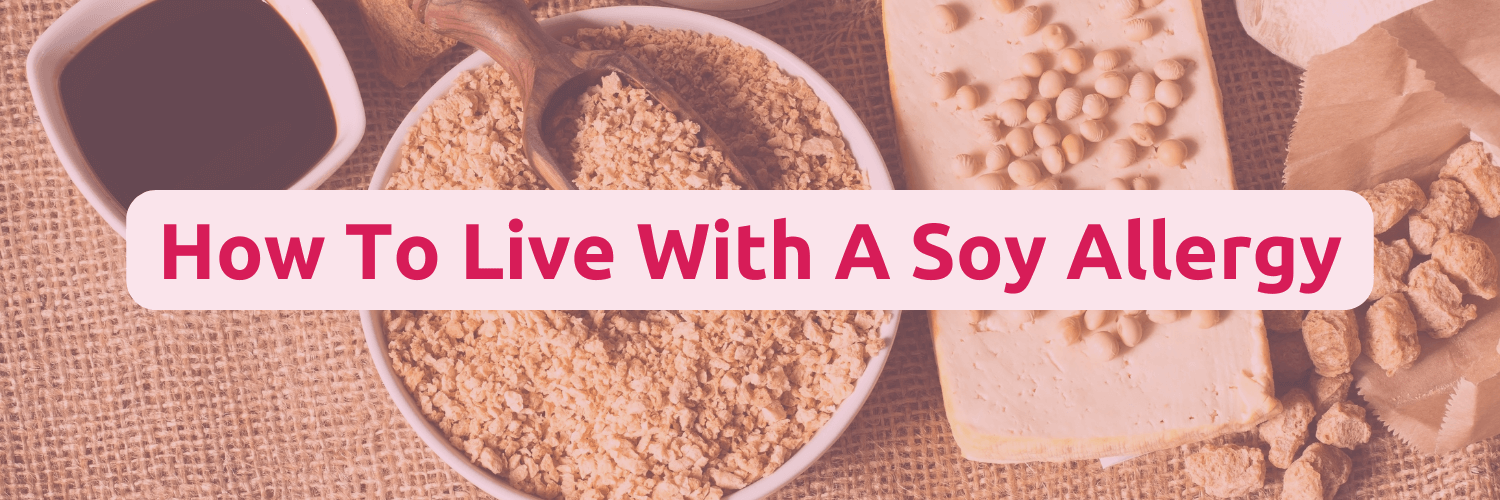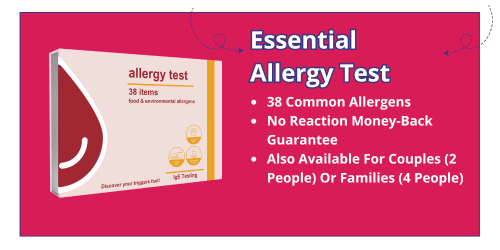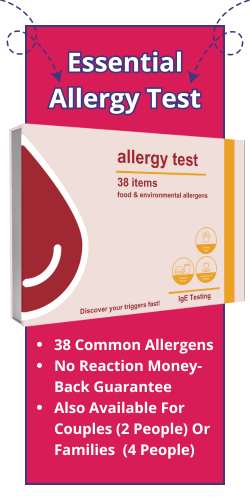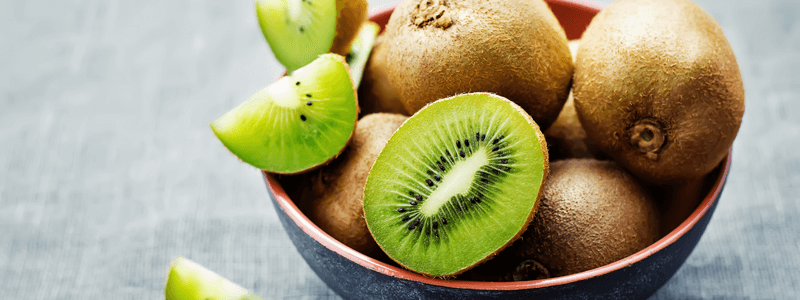
Kiwi is a fruit currently grown worldwide for consumption, but before it was such a common fruit, it was only native to China. People living in China knew kiwi to be a fruit that came from a bush, and they called it Chinese gooseberry. But in 1906, New Zealand started growing and exporting the fruit and changed its name to honour their national bird, the kiwi. This fruit was also introduced to Britain in the 1970s, and it has become increasingly popular ever since then. With the increasing consumption of fruit, there has also been an increase in kiwi allergy. Now that we know the history of this amazing fruit, it’s nice to know why it’s so common.
Kiwi contains antioxidants, omega-3 fatty acids, carbohydrates, dietary fibres, vitamins, natural sugars, and minerals. They also come in two varieties, green and gold. The gold kiwi contains fewer allergens than we know exist in green kiwis. Even though most people consume kiwi in fresh forms, it’s also common to find it in frozen items, juice, dairy products, baked goods, or even consumed as dried slices. In recent years, kiwi has risen as a common allergen as it currently ranks top 10 in food allergies worldwide{1}.
Kiwi allergy symptoms
The symptoms of kiwi allergy vary from severe to mild. The mild reactions of kiwi allergy include oral allergy symptoms. Oral allergy symptoms occur in the mouth, lips, and tongue. So one is most likely to experience itching and swelling in those three areas. This isn’t a true kiwi allergy but rather a cross-reactivity of the proteins to the birch tree pollen.
The more severe symptoms of kiwi allergy include anaphylaxis. Symptoms of anaphylaxis include a drop in blood pressure and an inability to breathe. This reaction is always a medical emergency.

A man scratching his forearm.
For those with a true kiwi allergy, symptoms include:
- Eczema
- Rashes
- Hives
- Vomiting
- Abdominal pain
Kiwi allergy symptoms start mild and then worsen if you keep eating the fruit. The first time you consume kiwi, you might get mild reactions like itching around the mouth, but you’ll end up with more significant symptoms once you consume the fruit again. Most people experience the kiwi symptoms right away, while others might experience them after a while. Children are more likely to experience severe kiwi allergy compared to adults.
In relation to oral allergy syndrome (OAS), kiwi is the most common culprit. If you get OAS symptoms like the ones we mentioned above upon consuming kiwi, you need to stop eating the fruit and wash your mouth to get rid of any remaining pieces. Sometimes, people develop rashes in areas where the skin makes contact with the fruit. These are extreme cases and most uncommon. Most of the time, it’s unlikely to experience severe cases like anaphylaxis, so you shouldn’t be too worried about it.
How long does kiwi allergy last?
Upon consuming the fruit, kiwi allergy symptoms often start between 20 minutes to a few hours. Sometimes, the first symptoms of kiwi allergy go away after a few hours, then come back one to four hours later or longer. This second phase of kiwi symptoms is known as a biphasic reaction. The risk of getting this biphasic reaction is the reason why doctors ask patients to stay overnight at the hospital for observation.
Most food allergies affect kids below the age of three because this is a time when these children are experiencing new foods resulting in allergic reactions. Even though most children experience allergies at a young age, they also grow out of most of these allergies as they start maturing. Allergies like peanut and tree nuts are usually more long-lasting. But if you develop a food allergy in adulthood, it often persists to be a lifelong allergy. For unclear reasons, over the past 20 years, food allergy rates have been growing globally. However, it’s safe to note that deaths resulting from anaphylaxis-related food reactions are quite rare these days.
Kiwi allergy: Foods to Avoid
Even though your kiwi allergy may initially be mild, it can become severe the more you consume the fruit. If you react to raw kiwi, you must avoid the raw fruit. There are different varieties of kiwi, but the green kiwi is the most common one, also often known as Hayward Kiwi. There are also other kiwi varieties like gold kiwi and kiwi berry. All these varieties of kiwi may cause allergic symptoms if you have a kiwi allergy, and avoiding them is safer. There are six varieties of kiwis worldwide, and these three are the most common. So, if you’re travelling a lot, you must keep an eye out for Kiwis.
Other ways to minimise the risk of a kiwi allergy are:
- Be cautious when eating fruit salads, fruit ice creams, pre-packed frozen fruits, sorbets, gelatos, and smoothies, because they often are contaminated with kiwi.
- Inform those around you about your allergy, including family, friends, hosts, and restaurants. Food contamination is common and can cause a severe reaction to those allergic, so you need to be cautious to avoid any accidental contaminations.
- Be keen when reading labels, even when you’ve bought an item before since recipes change. You may find that the new ingredient is something you’re allergic to, which isn’t good for your general health.
- Be cautious when eating other fruits like bananas, chestnuts, and avocados. An allergy to kiwi increases your chances of being allergic to these other fruits{2}.
Sometimes kiwi is used as an ingredient in unlikely foods. For example, certain companies use kiwi to glaze paté or tenderise meat. To avoid allergic reactions, you must read ingredient lists before trying new drinks and foods. Sometimes kiwi is also used as an extract in biological cosmetics, so you must watch out for that too.
Causes of kiwi allergy
According to researchers, there are 13 different allergens present in kiwi. Even so, these are harmless substances to your body, but in the case of a kiwi allergy, the body mistakes it for something dangerous, prompting an allergic reaction. Because there are too many allergens present in kiwi, this may mean that you’re allergic to other things too. This is also known as cross-reaction. Foods that can cross-react with kiwi include:
- Apple
- Avocado
- Banana
- Birch pollen
- Grass pollen
- Hazelnuts and other tree nuts
- Latex
- Melon
- Peanuts
- Poppy seeds
- Potatoes
- Ragweed
- Sesame seeds
- Wheat
According to studies, kiwi allergies mostly affect people living in geographical areas with lots of birch pollen. Kiwi and latex share at least two allergens. Latex is naturally produced by rubber trees and similar plants and is used in making condoms, surgical gloves, and similar products. It is often common to find someone allergic to kiwis also reacting to these products. You might also react to other pollens, vegetables, and fruits when suffering from a kiwi allergy.
An allergy to kiwi develops when the immune system detects certain proteins found in the fruit for harmful substances like bacteria and viruses. So, the immune system releases white blood cells and other compounds like IgE antibodies to attack these substances. Because of this reaction in the immune system, you will then develop symptoms of a kiwi allergy.
When to test for kiwi allergy
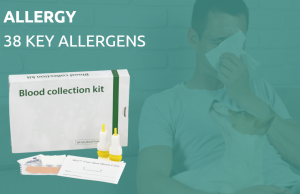
Our Allergy 38 Test.
If you notice symptoms every time you eat kiwis, you might suffer from a kiwi allergy. Before we suggest a plan of action, we advise you to visit a doctor to check for any possible underlying diseases or conditions. If none are available, then you need to get kiwi allergy testing.
If you notice your mouth gets itchy when eating raw kiwi, it’s about time you got yourself an Allergy Test. The issue with kiwi allergy is that there are various reasons you could be experiencing these symptoms, starting from birch pollen allergy to cross reactivity. It is advisable to take a Home-lab allergy test so that you can know for sure whether you have a kiwi allergy or not.
If you’ve ever experienced anaphylaxis, it is wise to always carry an EpiPen with you. Sometimes contact with kiwi is accidental, and you need first aid, which the EpiPen will help with. Even though an EpiPen relieves symptoms, it is still wise to rush to the hospital immediately because of a biphasic reaction.
Final thoughts on kiwi allergy
Kiwi is a highly nutritious and popular fruit but one that also results in allergic reactions in many. It is hard to pin down kiwi as an allergy because it shares symptoms with many other food allergies. If you suffer from kiwi allergy, it is most probable that you may also have other food allergies, and that’s why it’s wise to take an Allergy Test. This allergy test will help you know which foods your body is allergic to so that you can avoid them. You will also likely get an EpiPen from your doctor if you ever suffer from an allergic reaction. You must carry this with you at all times to administer whenever you suffer from allergic reactions.
References
- Wang, J., Vanga, S. K., McCusker, C., & Raghavan, V. (2019). A comprehensive review on kiwifruit allergy: pathogenesis, diagnosis, management, and potential modification of allergens through processing. Comprehensive reviews in food science and food safety, 18(2), 500-513.
- Gawrońska-Ukleja, E., Różalska, A., Ukleja-Sokołowska, N., Żbikowska-Gotz, M., & Bartuzi, Z. (2013). Anaphylaxis after accidental ingestion of kiwi fruit. Advances in Dermatology and Allergology/Postępy Dermatologii i Alergologii, 30(3), 192-194.




